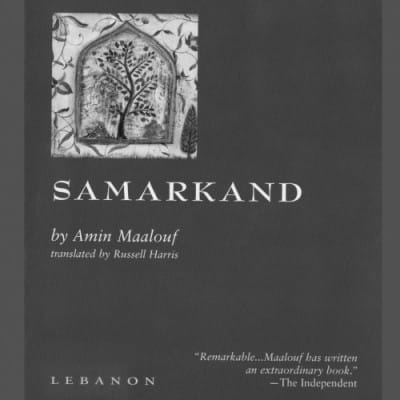Samarkand: A Review

"Look 'round thee now on Samarcand,
Is she not queen of earth? Her pride
Above all cities? In her hand
Their destinies?"
So wrote Edgar Allan Poe in the nineteenth century. (1809-1849).
The towering figure of the eleventh century Omar Khayyam (1048-1131) of Nishapur, Persia; the "Star of Khorassan, the genius of Persian and Mesopotamia, the prince of philosophers" is the principal character of this absorbing and compelling historical novel. One is flying the magic carpet as Maalouf's splendid story-telling sweeps the reader to ancient cities. The odyssey mentions Alamut, Balkh, Baghdad, Basra Bukhara, Cordova, Damascus, Isfahan, Kashan, Mecca, Merv, Qom, Shiraz, Tabriz, Tehran. There is the alm-house, the bazaar, the citadel, the dungeon, the Emir, the Nizam, the Princess, the Shah, the Sultan, the Vizier and all along Maalouf weaves a tale that evokes exotic colours, tastes and smells of the Orient. It is in Samarkand that Khayyam starts to compose the quatrains whose collection constitutes the immortal Rubaiyat. And in it he wrote: "Samarkand, the most beautiful face the Earth has ever turned towards the sun".
Noting that, "Both Paradise and Hell are in you," Khayyam befriends Hassan Sabah who becomes the Grand Master of the Assassins at Alamut in Persia – an individual who threatens the system and the status quo. "How can precautions be taken against a man intent on dying? […] What if the attacker is not afraid of dying, and has been convinced that his martyrdom is a short-cut to paradise? What if he has imprinted in his mind the words of the Preacher: "You are not made for this world, but for the next?" Fast-forward to the twenty-first century and it is hard not to draw comparison to the complex violence-ridden scenario in many a country today. There is "the heroism of despair" where Machiavellian means of political intrigue justify scorched earth and survival.
Now enters a twentieth century character - an American Benjamin O. Lesage whose middle name is Omar – so named by his parents who were impassioned readers of Omar Khayyam. Destiny calls him to pursue a trans-continental search for the lost 'original' manuscript of the 'Rubaiyat.' It takes him to London, Paris and many a city in Persia where the Great Game between the English and the Russian for the oil-rich country is in full power-play. The 'original' manuscript following a thrilling trail is finally located in the possession of a Persian princess Shireen.
"You ask what is this life so frail, so vain,
Tis long to tell, yet will I make it plain/
Tis but a breath blown from the vasty deeps,
And then blown back to those same deeps again."
On 14th April 1912, Benjamin O. Lesage and his wife Shireen survive the sinking of the ocean-liner. "The Titanic was now in a vertical position and its lights had dimmed. She stayed like that for five endless minutes and then solemnly plunged towards her destiny." The very Titanic whose Captain Smith had once declared: "God Himself could not sink this ship". And with it went down the only copy of the Rubaiyat of Omar Khayyam, the Persian sage, poet and astronomer". And so begins a tale that has to be told, for
"We are the pawns, and Heaven is the player;
This is plain truth, and not a mode of speech.
We move about the chessboard of the world.
Then drop into the casket of the void."
And
Arise, we have eternity for sleeping!
Raana Haider is a literary pilgrim.

 For all latest news, follow The Daily Star's Google News channel.
For all latest news, follow The Daily Star's Google News channel. 



Comments